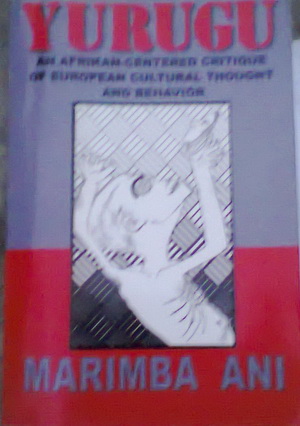The Rhetorical Function of the “Christian Ethic”
Posted by By Akogun Akomolafe at 19 June, at 09 : 47 AM Print

Warning: count(): Parameter must be an array or an object that implements Countable in /home/alaye/public_html/wp-content/themes/Video/single_blog.php on line 56
From the book, YURUGU by Marimba Ani. (note: please this is not a review)
Since many of us look blindly at Christianity as the personally delivered word of “GOD”, which is unalterable and a-historical, I am providing the following selection from the new book, Yurugu. Yurugu was written by Marimba Ani (Dona Richards) and published by Africa World Press.
It is a massive work on European though and culture and its effects on the African community.
It provides invaluable references and glimpses of the history behind the development of European culture. This book is a must read.
The Rhetorical Function of the “Christian Ethic”
The idea inherent here is crucial for it implies an unfolding of the asili. What I have argued earlier and wish to reiterate and develop further in this discussion is that what is invariably referred to as the “conflict” between Christian “values” and European imperialistic and aggressive behavior has indeed never represented conflict but is to be understood in terms of the intent of Christian ideology.
As I said, all religious statements are likely to be shaped in time so as to be consistent with the nationalistic objectives of the cultures within which they were created. Religious statements provide ideological, spiritual, and emotional support for the maintenance of cultural entities and help to define, simultaneously as they reflect, the definition of the collective personality of the individuals within them. European culture is, in this respect, no different from any other. What varies from culture to culture is its ideological content; its asili.
The character and definition of its “nationalism,” the religious statement and the cultural utamawazo necessarily share the same characteristics. This is true whether the culture is basically “traditional” and “sacred,” in which case the two are barely distinct, or if it is “secular,” where religion becomes separated and institutionalized. In either case, the religious statement of a particular culture must by definition be consistent with the values of that culture, as both religion and value are determined by the asili. It is the function of any “official religion” to give ideological support to the culture as a whole.
Once established and formalized, all religious ideologies are, in this sense, “nationalistic” ideologies. In spite of the elements in the Christian formulation that can be traced to Africa (Kemet), Christian ideology is essentially a creation of the European asili and can only be understood as a statement that supports the values of that culture.
European cultural commitment is unique among “nationalists ideologies and in fact becomes internationalist in expression. Its primary objective is the worldwide expansion of European culture and the resultant control of other peoples. The Christian formulation, when hardened into ideology, developed as consistent and not in conflict with this objective. As European nationalism and the European utamaroho were both dependent on and directed toward “others” (people, places, cultures) to be controlled-to have power over-so the Christian statement was a mandate for archaic Europe (Roman) control, and propaganda was addressed to the objects of that control as well. No matter how subtly and ingeniously this function was performed, the fact remains that what is usually referred to as the “Christian ethic” (“universal love, brotherhood and peace,” “the meek shall inherit the earth,” “turn the other cheek,” “love thine enemy”) once officially recognized by the State, was not designed for the assimilation or moral guidance of the Europeans. (What is referred to as the “Protestant ethic” is another case to be discussed in relation to European behavior in Chap. 7.)
There is something wrong with a cultural/historical analysis that maintains that a culture as successfully sustained and as persistent as that of Europe could have been created, have survived, developed, and intensified to such mammoth proportions under the continual handicap of a religious statement that basically contradicted and conflicted with that growth and the form that it took! This is where the contradiction lies, and this ethnological contradiction alone should have given rise to other explanations of the “Christian ethic” in its European context. The asili concept demands an ideologically consistent explanation of cultural phenomena.
To recapitulate briefly: The Christian statement said that religion should be “universal,” thereby discrediting other religions that were obviously and avowedly culture-bound. It claimed, in fact, to be the properly “universalistic” religion; giving European conquerors the moral justification they needed to turn their politically aggressive actions into seemingly altruistic ones. (See Chap. 2) But what is most important here is that the Christian ideology pronounced as virtuous those very modes of behavior that immobilize a culture politically, render its members susceptible to European control, and less able to resist: The pursuit of “peace,” the “love” of One’s enemy (which concretely implies the betrayal of oneself, the “brotherhood of man” an abstraction that concretely manifests itself as the denial of one’s culture and therefore one’s ideology and commitment. All of these elements combined to form the ideal psycho/cultural counterpart to political subjugation. And it succeeded in doing the job that it was culturally designed to do. It did not affect the overwhelming historical pattern of European behavior, which is characterized by antithetical tendencies to those mentioned above. The growth of the empire was not impeded by passivity and love; rather it thrived on the intensely aggressive and hostile behavior that the asili of the culture encouraged European theorists have invariably failed to interpret correctly this function of the “Christian ethic” in its European context-a failure that has been endemic to Western social theory whether representative of the right or the left-whether avowedly nationalistic or “critical.”
Joel Kovel says, “Within the original Christian world-view, there was no way to rationalize or include the strivings for greed and domination that persisted within civilization.” Constantine apparently recognized the value of Christian ideology for Western European expansion and had no difficulty using it without refashioning the “original” Christian formulation. (if by “original” we are referring to its archaic European manifestation and not its earlier African origins.) A “use” that Kovel, himself inadvertently describes:
Christianity spread over the West and created a community out of what had been barbarian splinters. It did this through the power of a concrete institution, the Catholic Church. It was the Church’s immediate influence that held aloft the subliminatory ideal of Christ and, through that ideal, gave Europeans a scaffold of identification with which to bind themselves into a unified civilization.
Kovel says that Christianity turned “away form the world” and that it “could only curse from a distance,” thereby introducing “a split into the cultural universe.” This “turning away” can be interpreted as being “written in” to the definition of an early adumbration of the two-sided nature of the European ethic. It is not the European’s “cultural universe” that is split; that remains consistent and intact precisely because of the distinction between the standards of intracultural behavior and the standards of behavior towards others; between his words and his deeds; between the “rhetorical ethic” and the ethic that in fact guides European behavior. As a result of their utamawazo and the nature of their intercultural objectives, Europeans have developed an entire semantical system designed for export-for the purposes of nationalistic propaganda-for appearance-for “others,” e.g., like advertising.
The fact that some individuals may have begun to incorporate the image that has been projected of them, does not alter the cultural significance of that image. Their behavior is anomalous. The fact remains that the “Christian ethic” never informed or reflected characteristic European behavior. The behavior pattern it suggests never corresponded with the European cultural self-image. That is the ethnological point. It always represented an image that Europeans found to be politically expedient in terms of their expansionist and exploitative objectives with regard to other people.
And this relationship to the nature of the culture is not anew one; to the contrary, it is an aspect of the cultural affinity between the developing archaic Western empire and the Christian formulation-a reason for the early coop-tation of the latter.
If this seems unreasonable in terms of the behavior and psychodynamics of most peoples, it must be continually kept in mind that the European utamaroho is unique and must be understood in terms of itself and its own peculiar dynamics-the asili of the culture. In this theoretical context the “split” becomes ethnologically explainable.
It is culturally designed to serve the imperialistic pursuit of a culture whose dominant cohesive ideology is based on a power drive, Or, in Nietzschean terms, “The will to power.” To ensure Success, it was necessary to have a hypocritical element; an “avowed,” professed ethic that masked the European’s true intent; to describe “arrogance” as “humility.”
Raw aggressiveness towards other people would have been resisted by them much more successfully without the use of the “rhetorical ethic.” With it, Europeans could elicit the cooperation of those within the cultures they sought to conquer. To view European imperialism as beneficent “universalism” and “altruism” also helps to enlist the aid of those individuals within European culture who need to view themselves as “world saviors”; they can encourage the imperialistic pursuit in the form of European paternalism. But this is not the primary function of the “rhetorical ethic”; it is primarily designed for export.
Kovel says that as a result of the “split,” the “West became faced with an increasing gap between its superego ideal and its ego practicei”s Not only do these so-called ideals fail to represent the European’s “superego” or any other part of his psyche, but it becomes questionable whether the commandment to “love” all people, including one’s enemies, could ever represent a culturally viable Since its early history, the “corruption” of the Church has been the concern of the “good” Christians. These are the individuals born into European culture who never understood Christianity in its European interpretation. The fact is that the overwhelming majority of Europeans automatically-not necessarily reflectively, but “naturally”- “understand” how to use this ethic because of their mutual participation in a common utamaroho; the ideology and collective personality that they share. The isolated instances of those who do not identify with this utornaroho (energy source) properly or totally and those who become confused by the “rhetorical ethic” have encouraged the illusion that it represents “conflict” in European ideology.
Kierkegaard represents the epitome of the individual who seems to be searching desperately in the culture for something that it was never meant to contain. He does not understand the asili. Kierkegaard’s accusation is that the “Christianity of the New Testament” no longer exists, but in my view it has never “existed,” certainly not as a European cultural possibility. Ironically, it is within other cultures that some of the espoused “Christian” values exist, insofar as they are humanly meaningful and concretely realizable. It is outside of the West that peace, compassion, spirituality, the lack of aggression, and intercultural tolerance are more likely to be found, since it is here that cultural philosophies are found to support such behavior. Kierkegaard’s “attack” is representative of the awareness of European hypocrisy, without the recognition of its ethno/historical significance. He says,
We are what is called a “Christian” nation-but in such a sense that not a single one of us is in the character of the Christianity of the New Testament… Christendom is… the betrayal of Christianity…. He adds that “Christendom” has done “away with Christianity by a false way of spreading it, making Christians of everybody and giving this activity the appearance of zeal for the spreading of the doctrine,” He is in the position in which anyone would find themselves were they to expect European social interaction to be determined by an altruistic, humble, or, simply, honestly verbalized ethic. Spengler’s conception of the “Christian ethic” is much more accurate, and his very different perspective brings him closer to a more realistic assessment of the significance of the Christian teachings in the context of European ideology:
My kingdom is not of this world… A ruler who wishes to improve religion in the direction of political, practical purposes is a fool. A sociologist-preacher who tries to bring truth, righteousness, peace, and forgiveness into the world, of actuality is a fool also. No faith yet has altered the world, and no fact can ever rebut a faith. There is no bridge between directional Time and timeless Eternity, between the course of history and the existence of a divine world order. This is the final meaning of the movement in which Jesus and Pilate con/ranted one another In the one world, the historical, the Roman caused the Galilean to be crucified-that was his Destiny. In the other world, Rome was cast for perdition and the Cross became the pledge of Redemption-that was the “will of God.”
Religion is metaphysic and nothing else… and this metaphysic is not the metaphysic of knowledge, argument, proof (which is merely philosophy or learnedness), but lived and experienced metaphysic – that is, the unthinkable as a certainty, the supernatural as a fact, life as existence in a world that is non-actual, but true. …To ascribe social purposes to Jesus is a blasphemy…. His teaching was proclamation, nothing but the proclamation of those Last Things with whose images he was constantly filled, the dawn of the New Age, the advent of heavenly envoys, the last judgement, a new heaven and a new earth. italics added”
Spengler goes against the Judeo-Christian teleological concept of secular history, but otherwise his observations are informed by a characteristically European consciousness. They have a certain accuracy. In the Christian formulation, in its European interpretation, there is no authentic “communion” between the human and the divine This is rarely achieved, and so results in the “split” that Kovel talks about. This is not true of all religious formulations, however. In African thought, for instance, this meeting is achieved through the apprehension of the world as spirit and the philosophical conception of ancestor communion that it allows, as well as other cultural mechanisms such as ritual drama, The presence of sacred time and space are felt and evidenced in the ordinary existence of the people. Spengler, in opposition to Kierkegaard, interprets the meaning of Christian teachings in away that is workable for the European utamaroho.
In this interpretation Jesus’ life was not meant to be emulated by those who would survive on this earth, especially as it has been transformed by the Europeans. And, in opposition to Kovel, he implies that Christianity did not “turn away from the world” after the fact but was initially conceived as “otherworldly,” as remote and detached. Spengler’s concern is with those whose misconceptions would cause them to attempt to bring these “abstractions” into the “world of reality”; he is concerned lest those who do not understand the “true” nature (i.e., function in terms of the European asili) of the Christian teachings begin to convince the Europeans that they must behave according to the “rhetorical ethic,” and this would mean changing the culture. But, Luther and Calvin succeeded, in effect, in fashioning a new ethical statement, which was more in accord with the internal dynamics of the culture. The doctrines that they developed supported the competitive, individualistic, aggressive, rationalistic, nonspiritual, and detached behavior necessary for survival within the culture. There was no longer a question of emulating the New Testament portrait of Jesus.
Ayn Rand, like Spengler, is concerned that what she calls the “humanitarians” are “in power,” in fact, that their “antiscientific” influence has been felt throughout history. She is worried that they will defeat capitalism. “Capitalism,” she says “never had a moral base in this country…. There is a fundamental contradiction between capitalism and altruistic morality – capitalism demands the pursuit of one’s own interests.” This last point is absolutely correct and has deep cultural and historical significance. The historically exploitative, aggressive, cupacious, and selfish nature of European culture is the antithesis of the professed Christian virtues of “brotherhood,” “meekness,” “humility,” generosity and altruism.
But somewhere along the line Rand has missed something vitally important. The very traits of capitalism and European culture that she values are perpetuated not hampered by the claims of dishonest “humanitarians.” The Rockefellers do all they can to create a “humanitarian” image of themselves for public consumption. All of the most successful capitalists (therefore successful Europeans) are also Europe’s (Euro-America’s) greatest humanitarians. It is precisely those characteristics that Ayn Rand considers virtuous that have survived in European culture. This should be an indication that capitalism most certainly does have a strong moral base in the United States and that there is no functioning, normative “altruistic morality” in European-derived culture. She has been the victim of the rhetoric of her own culture; rhetoric not meant for her consumption.
Nietzsche is plagued by a similar concern in the “Anti-Christ”. It is difficult to understand why Nietzsche does not see that he is fighting an enemy that does not exist. He is concerned that the -‘Christian ethic” will retard the development and survival of the “superman.” He accurately describes the debilitating effect of Christianity but does not say that it has had this effect on “non-European” peoples in their dealing with the West. Nietzsche says that it tends to “weaken,” and he is right. But it “weakens” other cultures, while strengthening European power.
Christianity is called the religion of sympathy, Sympathy stands in antithesis to the tonic passions which elevate the energy of the feeling of life: it operates depressively. One loses force by sympathising.
And this is precisely the effect which Christianity has invariably had on those who would oppose European control; i.e., teaching them to sympathize with their enemies. Nietzsche makes the point that Jesus “dying for others” is the epitome of the negative political image-an amazingly astute observation. But he fails to make the connection between Europe’s overwhelming political success and its complete rejection of this image. Nietzsche’s fears are unfounded; the rhetorical ethic does not effect the European.
What is interesting in the thoughts of Spengler, Nietzsche, and even Rand is the lack of hypocrisy that I am considering here as a theme in European culture. They apparently reject the European rhetorical ethic; that is, they refuse to make the “Christian ethic” a part of their own “rhetoric.” Often theorists of the “right” in the West are more honest in their denial of the professed values of the “Christian ethic” than are European liberals in their verbal support. All too often this is the only distinguishing feature between them.
About the Author
Femi Akomolafe is a passionate Pan-Africanist. A columnist for the Accra-based Daily Dispatch newspaper and ModernGhana, and Correspondent for the New African magazine, Femi lives in both Europe and Africa and writes regularly on Africa-related issues for various newspapers and magazines.
Femi was the producer of the FOCUS ON AFRICANS TV Interview programme for the MultiTV Station.
He is also the Man and Machine Coordinator at Alaye Dot Biz Limited, a Kasoa-based Multimedia organization that specializes in Audio and Video Production. He loves to shoot and edit video documentaries.
His highly-acclaimed books (“Africa: Destroyed by the gods,” “Africa: It shall be well,” “18 African Fables & Moonlight Stories” and “Ghana: Basic Facts + More”) are available for sales at the following bookshops/offices:
- Freedom Bookshop, near Apollo Theatre, Accra.
- WEB Dubois Pan-African Centre, Accra
- Ghana Writers Association office, PAWA House, Roman Ridge, Accra.
- Afia Beach Hotel, Accra
Where to buy them online:
On Lulu Books:
18 African Fables & Moonlight Stories https://goo.gl/Skohtn
Ghana: Basic Facts + More: https://goo.gl/73ni99
Africa: Destroyed by the gods: https://goo.gl/HHmFfr
Africa: It shall be well: https://goo.gl/KIMcIm
Africa: it shall be well
on Kindle books: https://www.createspace.com/4820404
on Amazon books: http://goo.gl/QeFxbl
on Lulu Books: https://goo.gl/SQeoKD
Africa: Destroyed by the gods
on Kindle books: https://www.createspace.com/4811974
18 African Fables & Short Stories: https://goo.gl/s9tWAf
on Amazon books: http://goo.gl/1z97ND
on Lulu Books: http://goo.gl/KIMcIm
My Lulu Books page: http://www.lulu.com/spotlight/FemiAkomolafe
Get free promotional materials here:
- Africa: it shall be well: http://alaye.biz/africa-it-shall-be-well-introduction-in-pdf/
A FREE Chapter of ‘Africa: It shall be well’ can be downloaded here: http://alaye.biz/africa-it-shall-be-well-a-free-chapter/
- Africa: Destroyed by the gods (How religiosity destroyed Africa) http://alaye.biz/africa-destroyed-by-the-gods-introduction/
A FREE Chapter of ‘Africa: Destroyed by the gods’ can be downloaded here: http://alaye.biz/africa-destroyed-by-the-gods-free-chapter/
Femi’s Blog: www.alaye.biz/category/blog
Website: www.alaye.biz
Femi on Amazon https://www.amazon.com/author/femiakomolafe
Femi Akomolafe’s Lulu Books page: http://www.lulu.com/spotlight/FemiAkomolafe
Twitter: www.twitter.com/ekitiparapo
Facebook: https://www.facebook.com/FemiAlaye
Gmail+: https://plus.google.com/112798710915807967908;
LinkedIn: www.linkedin.com/in/femiakomolafe;
YouTube Channel: https://www.youtube.com/user/fakomolafe
Email: fakomolafe@gmail.com
Profile on New African magazine: http://newafricanmagazine.com/tag/femi-akomolafe/




